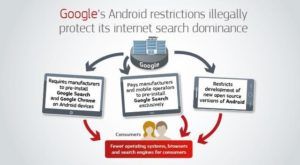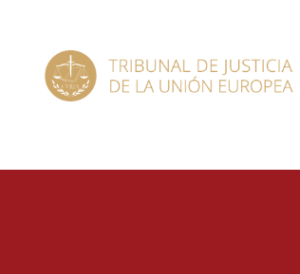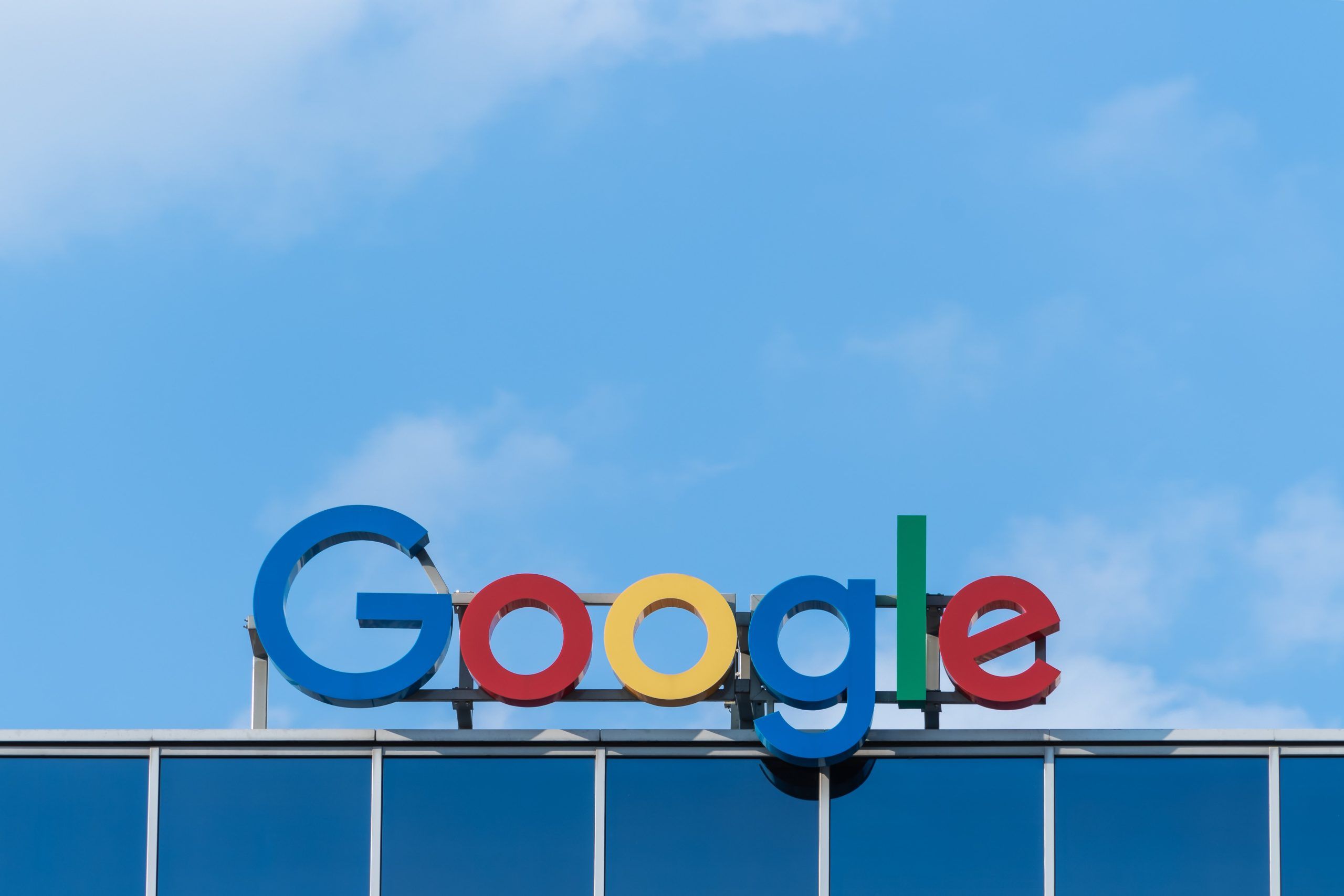The General Court largely upholds the Commission’s decision which found that Google had imposed unlawful restrictions on Android mobile device manufacturers and mobile network operators for the purpose of strengthening the dominant position of its search engine.
In order to better assess the gravity and duration of the infringement, the General Court reduces Google’s fine to €4.125 billion, following reasoning that differs in some respects from that of the Commission.
Google derives the bulk of its revenue from its flagship product, the search engine Google Search. Its business model is based on the interaction between, on the one hand, a number of products and services which are mostly offered free of charge to users and, on the other hand, certain online advertising services through the use of data collected from those users.
Google also offers the Android operating system, with which around 80 % of the smart mobile devices used in Europe in July 2018 were equipped. A number of complaints to the Commission about certain commercial practices of Google in the mobile internet area led the Commission to open proceedings against Google in 2015 in relation to Android.
By decision of 18 July 2018, the Commission sanctioned Google for abusing its dominant position by imposing anti-competitive contractual restrictions on mobile device manufacturers and mobile network operators. The restrictions subject to the sanction are of three types:
- Those incorporated in “distribution agreements“, which oblige mobile device manufacturers to pre-install the general search (Google Search) and browser (Chrome) applications in order for Google to grant them a license to operate its application shop (Play Store).
- Those incorporated in “anti-fragmentation agreements“, which condition the obtaining of the operating licences necessary for the pre-installation of Google Search and Play Store applications by mobile device manufacturers on the latter’s commitment to refrain from selling devices equipped with versions of the Android operating system not authorised by Google.
- Those embodied in “revenue sharing agreements“, which make the retrocession of a share of Google’s advertising revenues to the mobile device manufacturers and mobile network operators concerned conditional on their commitment to refrain from pre-installing a competing general search service on a pre-determined portfolio of devices.

La Comisión Europea impone a Google una multa de cerca de 4,34 millones EUR por prácticas ilegales en relación con los dispositivos móviles Android |
According to the Commission, all those restrictions were aimed at protecting and strengthening Google’s dominant position in the field of general search services and, consequently, the revenue obtained by Google from advertising associated with such searches. The common objective pursued by the restrictions at issue and their interdependence therefore led the Commission to classify them as a single and continuous infringement of Article 102 TFEU and Article 54 of the Agreement on the European Economic Area (EEA).
Consequently, the Commission imposed a fine of almost €4 343 million on Google, the largest fine ever imposed in Europe by a competition authority.
The General Court essentially dismisses the action brought by Google; it confines itself to annulling the decision only in so far as it finds that the portfolio revenue-sharing agreements referred to constitute, in themselves, an abuse. In the light of the particular circumstances of the case, the Court also considers it appropriate, by virtue of its unlimited jurisdiction, to set the amount of the fine imposed on Google at €4 125 million.
Findings of the General Court
First, the Court examines the plea alleging errors of assessment in the definition of the relevant markets and in the subsequent assessment of Google’s dominant position on some of those markets. In that context, the Court emphasises that it must ascertain whether Google’s exercise of its power on the relevant markets actually enabled it to act in an appreciable manner independently of the various factors capable of constraining its conduct.
Second, the Court examines the various pleas alleging an incorrect assessment of the abusive nature of the restrictions at issue.
- First, as regards, the pre-installation conditions imposed on the manufacturers of mobile devices, the Commission concluded that they were abusive by distinguishing, first, the Google Search and Play Store group of applications from the Chrome browser group and those applications and, second, by finding that those groups had restricted competition during the period of the infringement, without Google being able to claim the existence of any objective justification. The Court notes that, in order to establish the existence of a significant competitive advantage conferred by the pre-installation conditions at issue, the Commission considered that such pre-installation was likely to give rise to a ‘standstill bias’, as a result of the propensity of users to use the search and navigation applications available to them, capable of significantly and durably increasing the use of the service in question, without that advantage being capable of being offset by Google’s competitors.
- Secondly, as regards the assessment of the single pre-installation condition included in the portfolio revenue-sharing agreements, the Court finds, first of all, that the Commission was entitled to find that the agreements at issue constituted exclusivity agreements, in so far as the payments provided for were conditional upon the non-pre-installation of competing general search services in the portfolio of products in question.
- Third, as regards the assessment of the restrictions incorporated in the anti-fragmentation agreements, the Court observes that the Commission considers such a practice to be abusive in so far as it seeks to hinder the development and presence on the market of devices running a non-compatible fork of Android 7, without, however, calling into question Google’s right to impose compatibility requirements relating only to devices on which its applications are installed.

Asunto C-299/17 VG Media / Google. Sentencia del Tribunal de Justicia (Sala Cuarta) de 12 de septiembre de 2019. |
Third, the Court examines the plea alleging infringement of the rights of the defence, by which Google seeks a declaration, first, of infringement of its right of access to the file and, second, of infringement of its right to be heard.
- First, as regards the alleged infringement of the right of access to the file, the Court notes that Google’s objections in that regard relate to the content of a series of notes transmitted by the Commission in February 2018 concerning meetings organised by the Commission with third parties in the course of its investigation. Given that all those meetings were information-gathering interviews in relation to the subject matter of the investigation, it was incumbent on the Commission to ensure that they were properly recorded so that the company under investigation could, when the time came, take cognisance of them and exercise its rights of defence.
- Second, as regards the alleged infringement of the right to be heard, the Court observes that Google’s criticisms in that regard constitute the procedural aspect of the objections aimed at challenging the validity of the finding that certain revenue-sharing agreements were abusive, in so far as they are directed at challenging the refusal to hold a hearing on the AEC test applied in that context. Since the Commission adopted such a refusal vis-à-vis Google even though it had sent it two written statements of facts in order substantially to supplement the content and scope of the approach initially set out in the statement of objections on that point, without, however, adopting, as it should have done, an additional statement of objections followed by an oral hearing, the Court considers that the Commission infringed Google’s rights of defence and thus deprived it of the opportunity to defend itself better by presenting its arguments at an oral hearing. Consequently, the finding of the abusive nature of the portfolio revenue sharing arrangements must also be annulled on that basis.
- Finally, as regards its autonomous assessment of the amount of the fine in the exercise of its unlimited jurisdiction, the Court states that, although the contested decision must therefore be annulled in part, in so far as it finds that the portfolio revenue sharing arrangements are in themselves abusive, such partial annulment does not affect the overall validity of the finding of infringement made, in the contested decision, in the light of the expulsion effects resulting from other abusive practices carried out by Google during the period of the infringement.
The General Court FINDS that the contested decision must be amended in order to set the amount of the fine to be imposed on Google for the infringement committed at EUR 4 125 million. To that end, like the Commission, the Court considers it appropriate to take into account the deliberate nature of the implementation of the infringing practices and the value of the relevant sales made by Google in the last year of its full participation in the infringement. On the other hand, as regards consideration of the gravity and duration of the infringement, the Court considers it appropriate to take account of the evolution over time of the various aspects of the infringement and the complementarity of the practices in question in order to assess the impact of the foreclosure effects found by the Commission in the contested decision.
Source: Press release – Curia







Leave a Reply